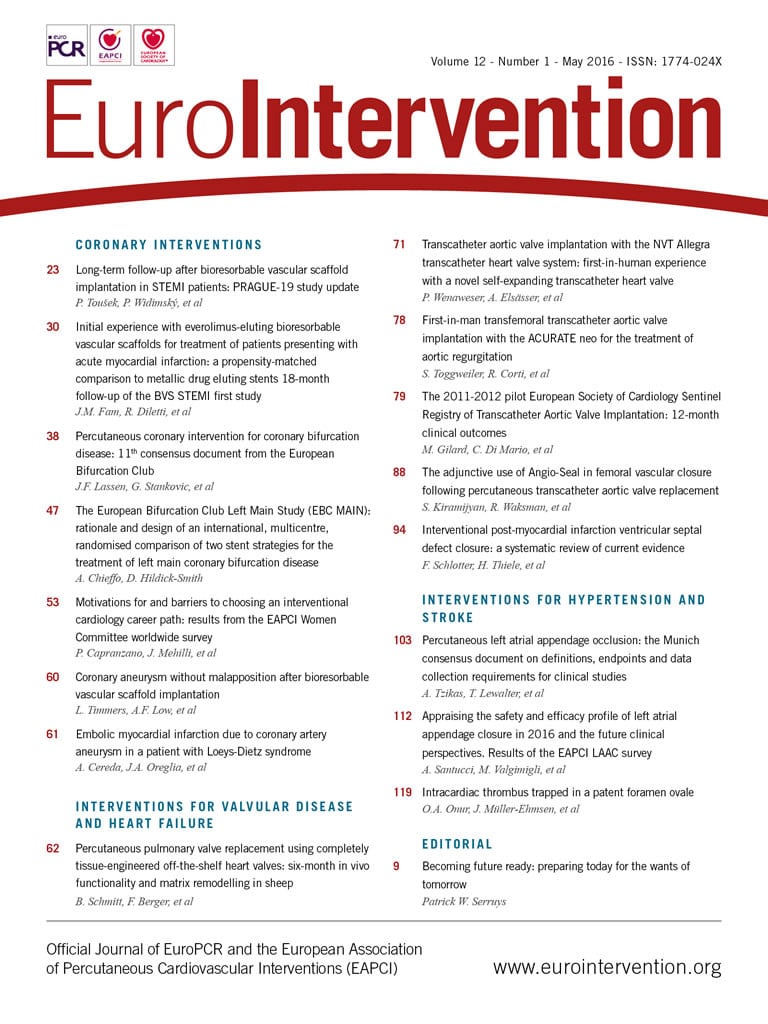NEWS
■ EAPCI Fellows Course: 9-11 June 2016 at the Heart House, Sophia Antipolis, France. This course is designed to aid the continued development of medical doctors who have started or have recently completed a programme of training in interventional cardiology in the core subjects of the syllabus. Register now!
■ EAPCI General Assembly: join the EAPCI Leadership during EuroPCR in Paris on Tuesday 17 May from 17:45 to 18:45, Room 253, Level 2, and find out about EAPCI past and future activities as well as the Board election results.
■ NEW! Visit the EAPCI website and find out about the “Cardiac Catheterisation Laboratory Core Curriculum for the Continuing Professional Development of Nurses and Allied Health Professions”, developed by the education working group of the Nurses and Allied Professions Committee for the EAPCI and presented during EuroPCR, 18 May from 14:45, Room 251.
EAPCI Focus on the EAPCI Fellowship Experience
An interview with Giancarla Scalone, EAPCI Fellowship awardee 2014
Why did you choose Barcelona as training site?
The Cardiology Department of Hospital Clinic Barcelona is an internationally recognised centre of excellence, under the fabulous leadership of Prof. Sabaté. Hearing from Salvatore Brugaletta how the research is performed there, I felt confident that I could benefit from the solid specialised training and research environment it offers. Salvatore and I studied at the same university in Italy, we were already friends, so this was an important point for me when taking the big step of leaving Italy for two years.
Why did you choose this fellowship topic?
My topic was endothelial function assessment in sudden death patients treated by primary percutaneous coronary intervention and hypothermia. This topic interests me, as current evidence strongly suggests that endothelial dysfunction correlates with cardiovascular events, demonstrating the importance of endothelial function assessment in terms of risk for future cardiovascular events in vulnerable patients, a particularity in acute phases of cardiovascular disease.
Did the training fulfil your objectives?
I was very satisfied with my training experience as I have fulfilled my professional objectives which were to improve my skills in cardiovascular research in general and in the field of interventional cardiology in particular.
What difficulties did you face during the fellowship?
During the first few months, the major difficulty was of course to learn another language. For instance, I had to speak to the patients in Spanish and explain why and how I was going to perform a coronary angiography. Naturally, my supervisors Salvatore Brugaletta and Manel Sabaté guided me gently through these first tough months. I am being sincere when I say that they are two unique people who helped me both professionally and personally. From the very first day, they made me feel that I was part of the family. Also, there were many other international fellows in Barcelona at the same time, fellows from Argentina, Mexico, Japan, and even another Italian from Sicily, Giuseppe Giacchi. It was a great atmosphere of friendship and fun: we supported each other and we learned many things together along the way.
Do you have any advice for future applicants?
I think being able to plan is the most important skill one must possess and, as a research fellow, it is a crucial element in the ultimate success of your fellowship. Also, sometimes the benefit of your fellowship may not always be evident in the short term but rather in the long term. There is, in some cases, a time “to sow the seeds” and a future to “reap”. Similarly, one must be committed to working very hard. In my case, mornings and evenings were dedicated to patient care and cathlab activities, while the weekends were for research. Naturally, there is very little free time, but when free time does arrive it is important to relax and to share this experience with the other fellows.
What are your future career plans?
I now work as an interventional cardiologist in Mexico, with a fellow whom I met in Barcelona. My plan is to stay here for another year and then return to Italy. I am lucky to have Prof. Filippo Crea as my chief in Rome and Prof. Sabate as my mentor: both have helped me a lot on my path to acquiring professional skills. Besides working hard to become a good interventional cardiologist, ultimately I would like to finish my PhD and continue to contribute more in the academic arena.
What was the impact of the support of EAPCI to your fellowship?
It has certainly given me a significant stimulus in my career. Thanks to the EAPCI and also to the EAPCI Women Initiative, I have been able to spend two successful years acquiring new skills in interventional cardiology as well as in research.
To what extent do you believe that this EAPCI initiative will impact on your career?
I think that, personally, I received a tremendous and positive boost in my professional life. It showed me how to strive for excellence in research and how to pursue high-quality and practical cathlab skills. From a personal point of view, it was an inspiring time to be part of an international group, to share and learn from/with each other. This human element is something that I am sure I will carry with me for the rest of my life.
` 
Giancarla Scalone,
Current institute: Catholic University of the Sacred Heart, Policlinico Gemelli, Rome, Italy/Hospital Angeles Puebla, Puebla, Mexico
Fellowship institute: Hospital Clinic Barcelona, Barcelona, Spain
Fellowship topic: Endothelial function assessment in sudden death patients treated by primary percutaneous coronary intervention and hypothermia
Fellowship period: September 2013 - September 2015
Fellowship lead supervisor: Manel Sabaté
Fellowship co-supervisor: Salvatore Brugaletta
Fellowship grant support: AstraZeneca

